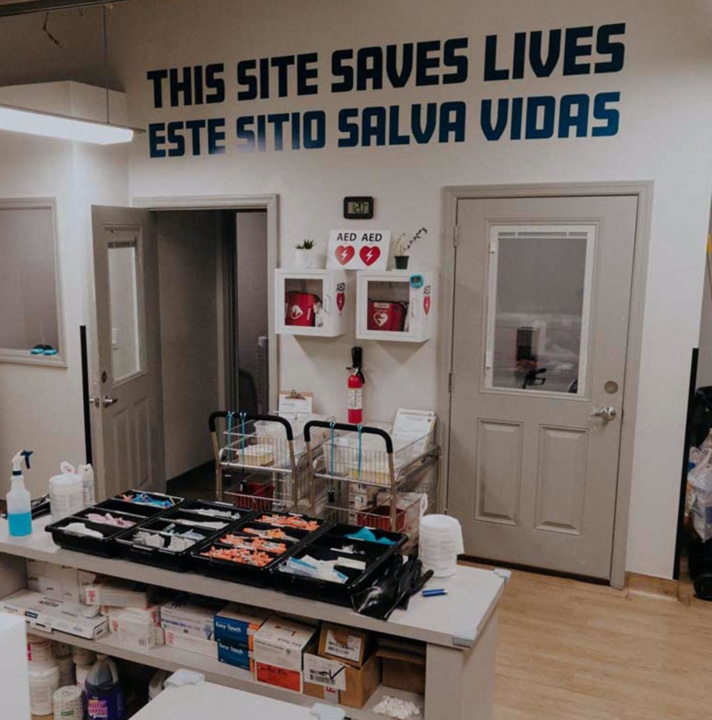
Overdose Prevention Centers (OPCs) (Deep Dive)
This section offers a deep dive into the issue of overdose prevention centers, or OPCs. To visit the main page for a quicker overview, click here. Otherwise, keep scrolling to learn more.

This section offers a deep dive into the issue of overdose prevention centers, or OPCs. To visit the main page for a quicker overview, click here. Otherwise, keep scrolling to learn more.
Why Overdose Prevention Centers are Needed
No one should die from a drug overdose. They are preventable. Yet, drug overdose is the leading cause of accidental death in the United States. More people die from overdose every year than in car crashes. Nearly 108,000 Americans died of a drug overdose in 2021 alone. Given the magnitude of the problem, we must set politics aside and do all that we can to prevent overdose deaths and save lives.
OPCs reduce overdose deaths and other potential harms associated with drug use. These life-saving services should be accessible across the country.
OPCs are facilities designed to reduce the potential risks of drug use, including overdose and unwanted public use. They are also known as supervised consumption sites and safer injection facilities. OPCs provide a space where trained staff supervise people while they use the drugs they brought with them. Visitors have access to sterile supplies and medication to reverse opioid overdose (naloxone). They can also test their drugs to identify add-ins. OPCs connect people with desired addiction services, like voluntary substance use disorder treatment.
Barriers to Opening Overdose Prevention Centers
Across the world, there are close to 200 OPCs operating in 14 countries. There are two overdose prevention centers in New York City and one is expected to open in Rhode Island in 2023. Even though 64 percent of American voters support opening OPCs, they are not available across the country.
Many other U.S. jurisdictions are exploring opening OPCs. Even though many legal scholars and law enforcement leaders believe that federal law does not prohibit OPCs, fear of federal law is a barrier to expanding OPCs. The federal Department of Justice has used the federal ‘crack house statute’ to block an OPC from opening in Philadelphia. This 1980s federal law was written at a time when lawmakers could not imagine a supervised facility where people could use drugs safely. They also could not have imagined the crisis and extreme need that exists today.
Often political leaders do not want to be the first to try overdose prevention centers, and neighbors want to support but do not want an OPC “in my backyard.” Local laws also stand in the way.
It’s time our elected leaders prioritize opening overdose prevention centers. The crisis and extreme need that exists today demand immediate solutions to prevent more tragic loss of life. The Drug Policy Alliance advocates for jurisdictions to establish OPCs and prioritize people’s lives over politics.
Allow for Overdose Prevention Centers Across the U.S.
We are fighting for a world where OPCs can operate in any community that needs them. OPCs are not a cure-all for the United States’ overdose death crisis. They are one critical intervention needed as a part of a broader harm reduction and social service infrastructure. OPCs are especially essential now due to increased levels of fentanyl in the drug supply. The prevalence of drugs like fentanyl and xylazine makes it even more important for people to have quick access to people trained in overdose response.
OPCs should integrate syringe exchange and drug checking to help identify add-ins like fentanyl. OPCs should adapt to the needs of the community served. Different models could include standalone facilities operated by medical professionals and facilities run by peers with lived substance use experience. There can also be integrated OPCs within existing healthcare services, mobile units, and pop-up OPCs.
Benefits of Overdose Prevention Centers
Over 35 years of research have demonstrated that OPCs produce numerous health and safety benefits.
OPCs achieve these benefits without any evidence to suggest that they increase drug use or crime. OPCs are uniquely effective at reaching people who use drugs and are experiencing homelessness. The European Monitoring Centre for Drugs and Drug Addiction concluded in 2018:
"The benefits of providing [OPCs] may include improvements in safe, hygienic drug use, especially among regular clients, increased access to health and social services, and reduced public drug use and associated nuisance. There is no evidence to suggest that the availability of OPCs increases drug use or frequency of injecting. [Overdose prevention centers] facilitate rather than delay treatment entry and do not result in higher rates of local drug-related crime."
European Monitoring Centre for Drugs and Drug Addiction
In 2021, the United States’ first official OPCs opened. In their first year, OnPoint NYC, which operates the two OPCs, reversed more than 600 overdoses. They also provide medical and mental health care, and other needed supports. OPC clients can see a doctor, get medicine, learn about addiction treatment options, and get food and clothing.
The evidence overwhelmingly supports overdose prevention centers. It’s time for action.

Election Day is around the corner… and we must be prepared to shape the national conversation about drugs. We need 250 donors to come forward before July 31!
